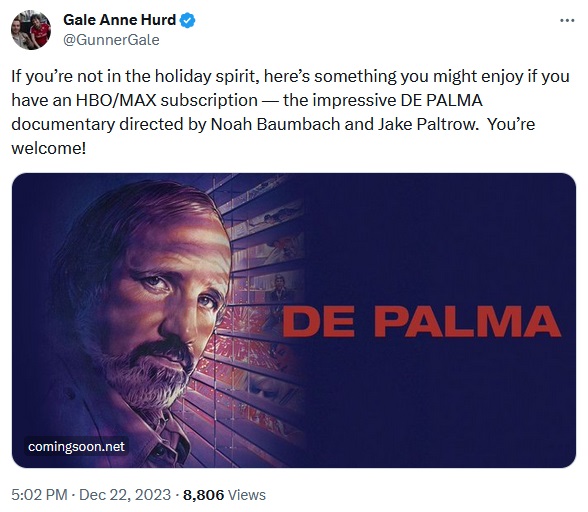
 Hello and welcome to the unofficial Brian De Palma website. Here is the latest news: |
|---|
E-mail
Geoffsongs@aol.com
-------------
Recent Headlines
a la Mod:
Listen to
Donaggio's full score
for Domino online
De Palma/Lehman
rapport at work
in Snakes
De Palma/Lehman
next novel is Terry
De Palma developing
Catch And Kill,
"a horror movie
based on real things
that have happened
in the news"
Supercut video
of De Palma's films
edited by Carl Rodrigue
Washington Post
review of Keesey book
-------------
Exclusive Passion
Interviews:
Brian De Palma
Karoline Herfurth
Leila Rozario
------------
------------
| « | April 2025 | » | ||||
| S | M | T | W | T | F | S |
| 1 | 2 | 3 | 4 | 5 | ||
| 6 | 7 | 8 | 9 | 10 | 11 | 12 |
| 13 | 14 | 15 | 16 | 17 | 18 | 19 |
| 20 | 21 | 22 | 23 | 24 | 25 | 26 |
| 27 | 28 | 29 | 30 | |||
De Palma interviewed
in Paris 2002
De Palma discusses
The Black Dahlia 2006

Enthusiasms...
Alfred Hitchcock
The Master Of Suspense
Sergio Leone
and the Infield
Fly Rule
The Filmmaker Who
Came In From The Cold
Jim Emerson on
Greetings & Hi, Mom!
Scarface: Make Way
For The Bad Guy
Deborah Shelton
Official Web Site
Welcome to the
Offices of Death Records
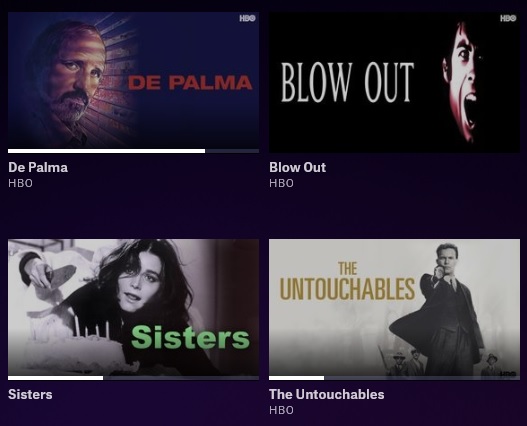
One of the great documentaries on filmmaking, “De Palma” is Noah Baumbach and Jake Paltrow’s loving homage to the modern master of suspense, which plays out like one long monologue. (The format is particularly ironic given his general hatred for overly talky movies.) Brian De Palma is one of his generation’s greatest talents and one of the most underrated. As he takes viewers through his filmography, film by film, a pattern starts to emerge – he’s a filmmaker obsessed by certain themes (voyeurism, sexuality, the slipperiness of a good conspiracy) and determined to bring those themes to life in the most entertaining way possible. He doesn’t always succeed. But the attempt feels Herculean and seldom appreciated. With humor, grace and candor he doesn’t just examine his work, he examines his life. And the resulting film is profound and arresting. Just be warned, after watching “De Palma,” you’ll want to re-watch all of his films again. – Drew Taylor
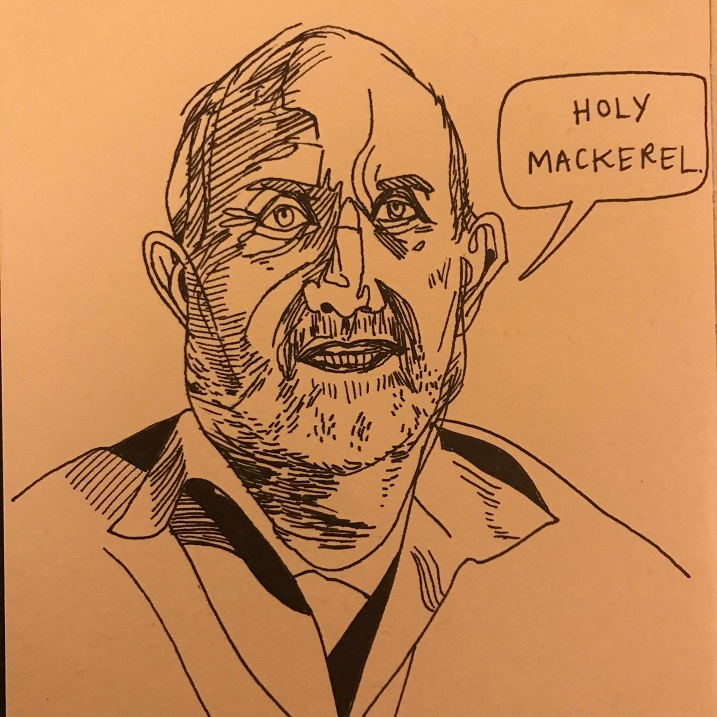
Merry Christmas! 🎄Here’s a portrait of director Brian De Palma that I drew while watching Noah Baumbach’s film “De Palma” about him on @mubi .
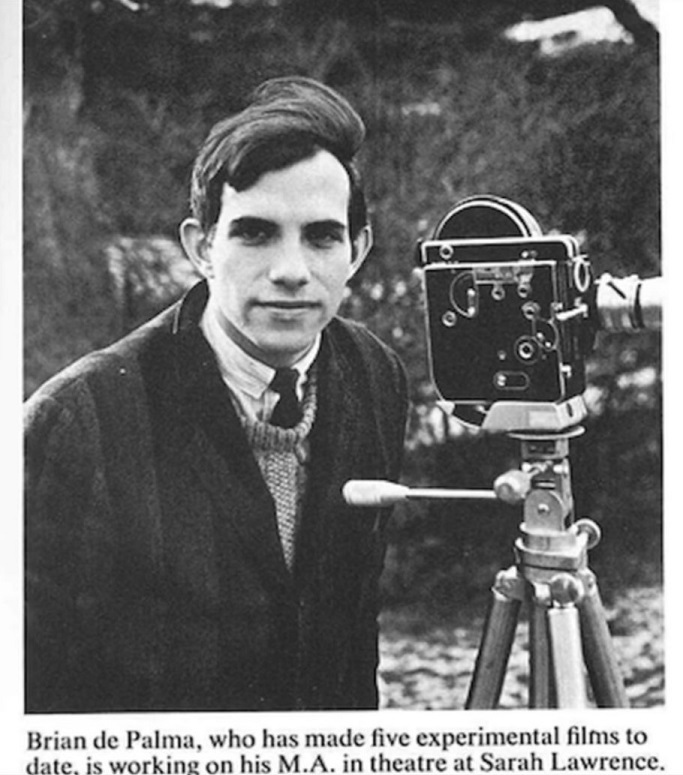
What modern American director: a) Went to Columbia for college to study "math, physics, and Russian"; b) Directed the feature screen debut of one Robert De Niro in 1965; c) Was present immediately after composer extraordinaire Bernard Herrmann, having just completed recording the score for "Taxi Driver," went back to his hotel and promptly died; d) Directed Orson Welles in his first big studio picture, at the tender age of 32; e) Helped cast "Star Wars"; f) Was best buds with fellow burgeoning auteurs Marty Scorsese, Francis Ford Coppola, George Lucas, and Steven Spielberg after arriving in L.A. in the late '60s; and g) Went on to make no fewer than at least a half-dozen (by my unofficial count) truly extraordinary pictures?Right, well, as you may have already guessed, the correct answer is Brian De Palma, a filmmakers' sort of filmmaker, not just because of his many homages to past masters, including Eisenstein, and, of course, his beloved Hitchcock, but also because he had his own vision and worked very hard to make the movies he wanted to make, usually at the expense of the castigating suits who funded his pictures.
Noah Baumbach and Jake Paltrow's documentary dispenses with all but the essentials: De Palma sits in a chair and methodically works his way through his rather extraordinary career, from his earliest days, making films as part of a workshop at Sarah Lawrence College, to his biggest hits -- including "Carrie," "Dressed to Kill," "Scarface," "The Untouchables," "Mission: Impossible" -- to his worst box office misses -- "The Fury," "Wise Guys," "The Bonfire of the Vanities," "Mission to Mars," among them. Through it all, he's open and honest as to the work he's proud of, and what he sees as a failure, as well as actors with which he worked (loved De Niro, Tom Cruise, Sissy Spacek; detested Cliff Robertson, found Welles stunningly unprofessional). What's more, representing the most venerated and decorated generation of American filmmakers in history -- one, it must be restated, given vastly more studio carte blanche in the early '70s than at any other point in Hollywood's existence -- he speaks of the problems he sees with modern studio films, finds the use of CGI both sort of thrilling, and ultimately bland (correctly pointing out the directors mainly have to pack off the footage and let the effects team figure out what happens in those many, many cliched battle scenes). But he's also almost eerily optimistic, in a way that gives you a better understanding of a director who has produced a kind of schizophrenic filmography of extreme highs and bitter lows. How a man took on massive disappointment, and heavy studio beef, over and over, and keeps picking himself up and coming back to try again.

EACH INCLUDED DE PALMA IN TOP 3 BEST ACTOR CATEGORY FOR 2016 VILLAGE VOICE POLL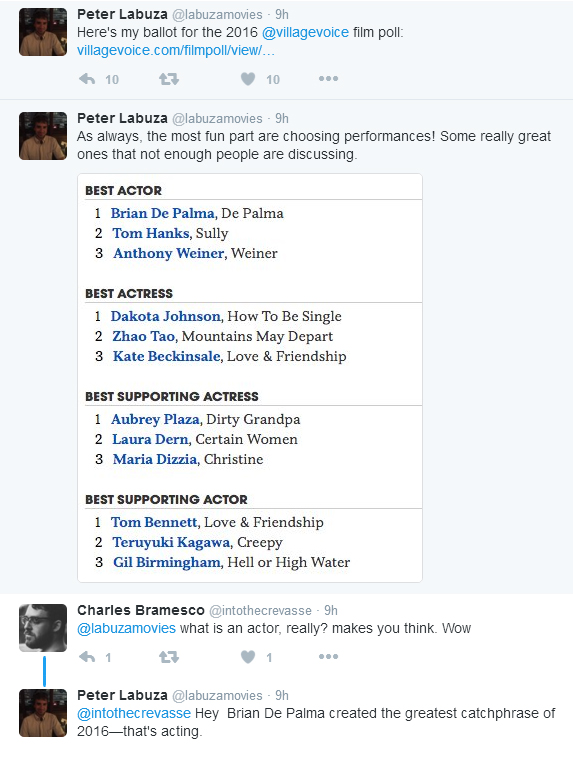 As can be seen at left, Peter Labuza included a couple of documentary subjects, including Brian De Palma, in his top three actors list for the Village Voice Film Poll 2016. Simon Abrams placed De Palma as his third best actor. De Palma ranks as the seventh best documentary of 2016 in the poll.
As can be seen at left, Peter Labuza included a couple of documentary subjects, including Brian De Palma, in his top three actors list for the Village Voice Film Poll 2016. Simon Abrams placed De Palma as his third best actor. De Palma ranks as the seventh best documentary of 2016 in the poll.
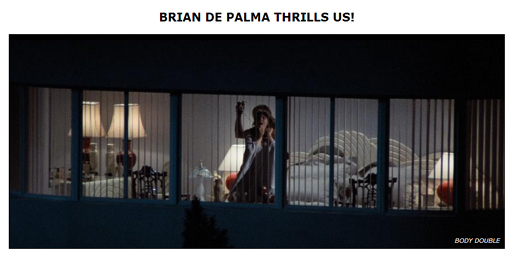
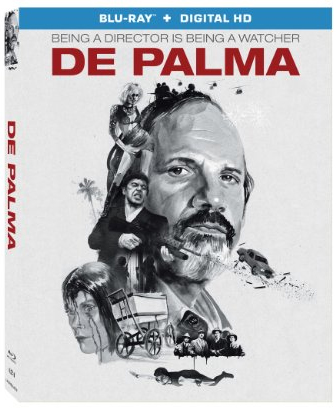 Earlier this week, it was announced that De Palma, the documentary co-directed by Noah Baumbach and Jake Paltrow, will be released on Blu-ray by Lionsgate on September 13th, two days after Brian De Palma's 76th birthday. According to Blu-ray.com, the running time is 107 minutes, which matches the theatrical version (curiously, the Amazon listing for the Blu-ray lists 93 minutes). No extras have been mentioned yet.
Earlier this week, it was announced that De Palma, the documentary co-directed by Noah Baumbach and Jake Paltrow, will be released on Blu-ray by Lionsgate on September 13th, two days after Brian De Palma's 76th birthday. According to Blu-ray.com, the running time is 107 minutes, which matches the theatrical version (curiously, the Amazon listing for the Blu-ray lists 93 minutes). No extras have been mentioned yet.
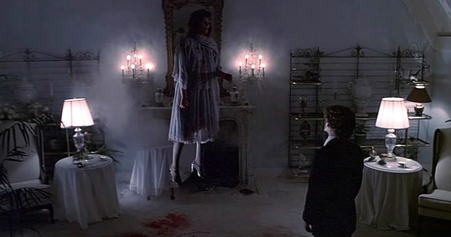 On his podcast this week, Bret Easton Ellis opens with a great riff on the backlash to Art Tavana's think piece about the upfront sex appeal of Sky Ferreira in LA Weekly, and then links it to the new De Palma documentary by wondering how the politically-correct backlashers (Teen Vogue et al.) would react to the sexual politics and violence on display in the average Brian De Palma film. Ellis calls Noah Baumbach and Jake Paltrow's documentary "the most enjoyable movie I’ve seen so far in 2016." Here's a bit of partial transcript from his podcast review:
On his podcast this week, Bret Easton Ellis opens with a great riff on the backlash to Art Tavana's think piece about the upfront sex appeal of Sky Ferreira in LA Weekly, and then links it to the new De Palma documentary by wondering how the politically-correct backlashers (Teen Vogue et al.) would react to the sexual politics and violence on display in the average Brian De Palma film. Ellis calls Noah Baumbach and Jake Paltrow's documentary "the most enjoyable movie I’ve seen so far in 2016." Here's a bit of partial transcript from his podcast review:De Palma’s self-aware voyeuristic relationship to not only his female characters, but the medium itself, like Hitchcock’s, was what gave his films a jolt, and made his films so endlessly fascinating, and complicated, as well as how technically facile and inventive De Palma dealt with the medium itself. De Palma’s perversity in staging violence was witty and very cinematic. I can’t think of a moment of realistic violence in a De Palma film… the stabbing in Sisters, the pig’s blood and the massacre at the prom in Carrie, Fiona Lewis spinning to her death, midair, and John Cassavetes exploding in The Fury, the elevator slashing in Dressed To Kill, the chainsaw sequence in Scarface. And all of this done on a grand scale that will never be replicated in movies again. Yes, this was the 1970s when De Palma started making a string of great films, with Carrie probably being his go-to masterpiece, and one of the key films of the New Hollywood. Though with each successive viewing of De Palma’s 1981 John Travolta conspiracy thriller, Blow Out, I’m not totally positive about that anymore. Though Blow Out is Quentin Tarantino’s favorite movie. My own personal faves from him remain Phantom Of The Paradise and Dressed To Kill, where the killer is a tormented, pre-op transexual. Oh my God, oh my God, I just heard the Teen Vogue staff self-immolating......There’s only one medium shot of Brian De Palma talking that we return to throughout the documentary, in the same room, in the same blue shirt, but the majority of the movie is a brilliant and seamless array of clips from De Palma’s movies, and it is a visually overwhelming experience. I had not seen some of these images on a big screen in decades, and I was in awe. Oh, my God, movies used to look like that. De Palma says at one point about him and Spielberg and George Lucas, and Coppola and Scorsese, the directors who led the New Hollywood revolution in the 1970s, that this kind of moment, this auteurist freedom played out within the studio system, with directors making films for adults, will never return. And it reminds us that it was over almost before it began. De Palma reminds us that it wasn’t Jaws or Star Wars that ended the New Hollywood (aesthetically, they are examples of it), it was actually (as John Carpenter pointed out a couple of weeks ago) the failure of one of the grandest auteur movies ever made by a studio, Michael Cimino’s Heaven’s Gate, that closed the door on an era. I don’t want to be a nostalgist, and neither does De Palma, but I feel a deep sense of loss comparing the movies then with the movies now.
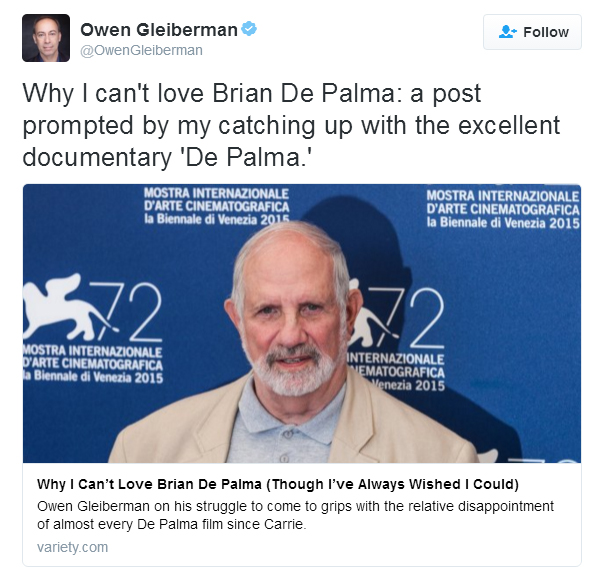 Earlier this year, Owen Gleiberman published a book called Movie Freak: My Life Watching Movies, in which he passionately describes being struck by cinephilia as a young man during a screening of Brian De Palma's Carrie in 1976. Yesterday, after seeing the new documentary, De Palma, Gleiberman posted an essay at Variety with the headline, "Why I Can’t Love Brian De Palma (Though I’ve Always Wished I Could)." In the essay, Gleiberman again describes seeing Carrie, and how he nevertheless feels that De Palma's "'50s science nerd" background has led to a cinema that is usually too Brechtian to sweep him up the way Carrie does. Here's an excerpt:
Earlier this year, Owen Gleiberman published a book called Movie Freak: My Life Watching Movies, in which he passionately describes being struck by cinephilia as a young man during a screening of Brian De Palma's Carrie in 1976. Yesterday, after seeing the new documentary, De Palma, Gleiberman posted an essay at Variety with the headline, "Why I Can’t Love Brian De Palma (Though I’ve Always Wished I Could)." In the essay, Gleiberman again describes seeing Carrie, and how he nevertheless feels that De Palma's "'50s science nerd" background has led to a cinema that is usually too Brechtian to sweep him up the way Carrie does. Here's an excerpt:In 1976, the first time I saw “Carrie,” it was the most dramatic film experience of my life. The movie had the kind of impact on me that other people experienced with “The Exorcist” or “Jaws” — it made my head swivel around with fear and excitement, with the sheer cinematic fairy-tale pleasure of what I was seeing, and I lived inside the experience for months. It took over my very being. I, of course, went back and read the Stephen King novel on which “Carrie” was based, and saw that the film followed the book reasonably closely. Yet in no way did that detract, for me, from De Palma’s achievement. The movie as he directed it was a dream, a vision, a hallucination made real, from the poetic horror of that opening slow-motion sequence in the girls’ locker room (which seemed, at first, to be nakedly voyeuristic, though it was really quite the opposite, since the film invited such a powerful identification with Sissy Spacek’s Carrie that it effectively put you in the locker room right along with her) to the scenes between Carrie and her ragingly sensual evangelical mother that were like a fire-and-brimstone version of “The Glass Menagerie,” to the spangly pop rapture of the Cinderella-goes-to-the-prom plot to the drenching bloodbath that submerges the party in hell to the telekinetic nerd’s homicidal revenge that all added up to make “Carrie” the most primal movie ever made about American teenage life. My attitude toward De Palma became, in its way, quite simple: You are God! Now, please, give me more movies like that one!I didn’t realize that De Palma was not only not God, but that he was, in fact, a kind of genius tinkerer, a director with scruffy counterculture roots who was basically a recovering ’50s science nerd. He envisioned filmmaking as a series of technical challenges to be solved. This was still the mid-’70s, when no one quite realized that the New Hollywood was over. De Palma had been washed ashore amid the same wave of young guns that brought Coppola, Scorsese, Lucas, and Spielberg, and all five of them were famously friends with each other, and the other four certainly had a vision (Coppola the dark poet of the America dream-turned-nightmare, Scorsese the vérité rock & roller of street crime, Lucas the inventor/bard of pop-nostalgia culture, and Spielberg the wizard of the everyday fantastic who literally seemed to think with the camera). So it seemed only right to assume that De Palma had a vision, too.
One thing he definitely had — because it ran through so many of his films — was a series of interlocking obsessions: with Hitchcock, with the freedom and sleaze of the counterculture, with the voyeurism of image-making, with the JFK assassination and the whole secretive flavor of conspiracy. (“Carrie,” in its way, was a conspiracy movie.) It certainly felt like all that stuff added up to a vision, and when “The Fury,” De Palma’s first movie after “Carrie,” also featured a plot that spun around the stop-motion drama of the freak ailment/gift of telekinesis, that now seemed to be part of his vision too. Who was Brian De Palma? He was a scruffy voyeuristic Hitchcockian conspiracy buff who drenched love stories in blood and believed in the power of the id to move things! That seemed about as good a definition of a movie director as one needed.
It certainly was for Pauline Kael, the critic whose fervent obsession with De Palma became the lens through which a lot of people viewed him. After “Carrie,” I never really agreed with Kael about De Palma, yet his movies put her into such a responsive trance — and she wrote so entrancingly about them — that I always wished I could see a De Palma movie just the way Kael did: as a more “heightened” version of a Hitchcock thriller. But when I watched a film like “Dressed to Kill,” I experienced it as a Hitchcock pastiche. The luscious tracking-shot fulsomeness of the opening Museum of Modern Art pickup scene was like “Vertigo” on some very powerful downer drugs, and it was (for what seemed like 10 or 15 minutes) ravishing cinema…but it was the high point of the movie! The slasher in limp blonde hair and sunglasses made the film seem like a replay of “Psycho” starring Sandy Duncan, and what De Palma really seemed to be clueless about is that the cathartic shock effect of a killer brandishing a straight razor against a backdrop of staccato violins was no longer the stuff of artful suspense. It was the stuff of interchangeable mediocre slasher films that were feeding, parasitically, off the same “Psycho” aesthetic that he was.
In the opening moments of “De Palma,” De Palma talks about how Hitchcock first seized him, an anecdote that may reveal more about him than he knows. He recalls going to see “Vertigo” when it opened at Radio City Music Hall in 1958. He was 18 years old, and it hit him the same way that “Carrie” hit me: as a movie that blew away everything he had seen before. What spun his head around about “Vertigo,” in which James Stewart tries to turn a shop girl played by Kim Novak into the literal image of the woman he loved and lost (also played by Kim Novak), is that in De Palma’s eyes, it was a metaphor for what filmmakers do. They mold and shape what’s right in front of them until it matches the fantasy in their heads. This comparison, between the plot of “Vertigo” and what Hitchcock himself was up to as a filmmaker, has been noted before, but what’s striking is how front-and-center the Stewart/filmmaker parallel is in De Palma’s own experience of “Vertigo.” He says that this lends the movie a “Brechtian” dimension.
But I don’t think that’s how most people experience “Vertigo” — as a Brechtian metaphor for filmmaking. And while there’s nothing invalid about De Palma’s reading of the film, I think it accounts for the overwhelming difference between the kind of director Hitchcock was and the kind that De Palma turned out to be. Hitchcock, for all the macabre comedy of his public persona, was a dizzyingly romantic artist who, beneath his virtuosity, was often swooning; his films were fire-and-ice. De Palma, on the other hand, wasn’t heightening Hitchcock so much as adding a layer of ironic detachment to him, using cool camera movement to impersonate fire. I think that accounts for why the thrillers in which he recycles “Vertigo” (“Dressed to Kill,” “Body Double,” “Obsession”) never find an emotional grip — they’re larks of Brechtian menace. There’s a place for that in cinema, but “Carrie” is a Hitchcock film, and that’s because it’s the one De Palma film that really does swoon.
Richard Brody's June 2nd post at The New Yorker ("The Brian De Palma Conundrum") similarly considers that De Palma's scientific and Brechtian impulses have a tendency to distance the films from the viewer. "That’s why," Brody writes, "despite my often stunned admiration for many of De Palma’s creations, I think that he’s a director who’s more often fascinating than great." Brody states at the start, "I think that movies are a medium—in the spiritual or metaphysical sense of putting the souls of viewers into connection with the souls of filmmakers." Hence for De Palma to create works that inherently seem to distance the viewer from the filmmaker, is to work against the way Brody thinks movies should work. But even if De Palma deliberately creates works that go for a Brechtian distance (and perhaps Brody also thinks De Palma does not go deeply enough in that direction), can he not create a great work of art in that mode? At one point, Brody confusingly states that there is no reflexivity in De Palma's films, even though we see reflexivity all over the place in De Palma's cinema. Here's an excerpt from Brody:
That’s the enduring paradox of De Palma’s films. Coming of age in the nineteen-sixties, he reveals himself, in his films, to be enduringly skeptical of authority. He distrusts the official word and the official version, whether that officialdom is the government’s or the corporate media’s. Yet De Palma films from a position of authority derived from the authority of the filmmakers he studied and the styles he inherited. There’s no reflexivity in his films, no sense that the fictional schema that he creates is itself in need of puncturing, no attempt to look behind the camera or see off-screen, no prism and no mirror that breaks his own frame. Even his most original trope, the split-screen, in which he creates an audacious counterpoint of images, veers from a thrilling representation of modern-day information overload to the visual equivalent of academic composition, in which contrasts and clashes are downplayed in favor of coherence and consistency.There’s an incipient and unfulfilled Brechtianism in De Palma’s work—a sense that the most efficient way to reveal the truth is to display the artifice that goes into the telling. That’s why many of his movies, whether “Sisters” or “Obsession,” “The Fury” or “Dressed to Kill,” “Blow Out” or “Casualties of War” or “The Untouchables,” have, as their stories, the creation of stories, the development of elaborately fabricated false-narrative fronts to conceal misdeeds. Yet the extreme artifice of De Palma’s amazingly intricate visual confections and virtuosic creations calls attention to what he does, not to how he does it.
Newer | Latest | Older